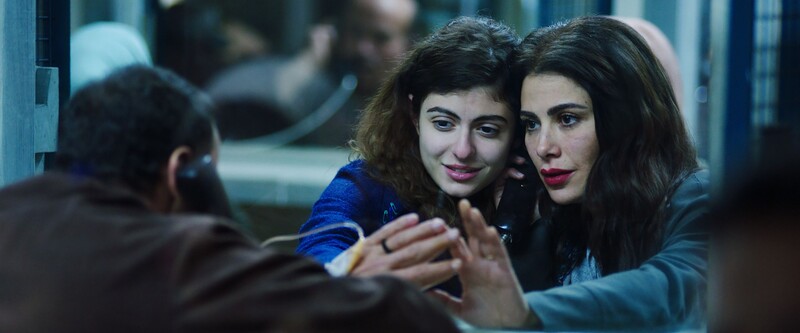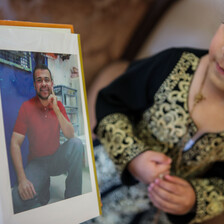The Electronic Intifada 22 December 2021

A scene from Amira.
The Royal Film Commission of Jordan has withdrawn the film Amira from Oscar contention in March of 2022. The film is about Palestinians, but does not seem intended for Palestinians to view – perhaps just as well as those who have seen it widely agree it painfully misses the mark.
In making the withdrawal announcement, the commission lauded “the artistic value of the film” and stated that “its message doesn’t harm in any way the Palestinian cause nor that of the prisoners.” In fact, the commission maintained that the film “highlights [Palestinians’] plight, their resilience as well as their willingness to live a decent life in spite of the occupation.”
Nevertheless, the commission conceded that because of the “huge controversy,” concerns about harming “the Palestinian cause,” and “out of respect to the feelings of the prisoners and their families,” the film should not be put forward for the Academy Awards.
“Huge controversy” is right. The stand-down followed a wave of rage among Palestinians and Jordanians who regarded the film as an aggression against the just cause of the Palestinian prisoners and their families. In Arabic, the hashtag Pull Out Amira went viral, trending on social media.
Mohamed Diab, the film’s Egyptian director, defended his film. But eventually he relented in the face of the national anger it had caused.
He announced the suspension of any screenings of the film, stressing that he did not intend to offend the prisoners and the Palestinian cause.
Amira raises a major, highly sensitive issue for the Palestinian people: the efforts of Palestinian prisoners with long-term sentences in Israeli occupation prisons to plant hope through birth. Due to Israeli prison restrictions against Palestinians, this requires sperm smuggling and artificial insemination.
The fictional events of the film revolve around the wife (Saba Mubarak) and daughter (Tara Abboud) of a Palestinian prisoner (Ali Suleiman). The husband’s sperm is thought to have been smuggled to the wife from the prison in a complicated process.
Eventually the child – Amira – learns that her actual father is an Israeli prison guard.
Outside the film
In real life, and with real sensitivities touched, one can see why controversy ensued.
Palestinian prisoners subjected to long years in prison by their oppressor seek escape and meaning to life through smuggling their sperm to their wives at health centers specializing in fertilization.
Their efforts pose a special challenge to the occupation system. Israeli authorities spare no effort to strip Palestinians of their humanity. Facing ongoing ethnic cleansing beyond that of 1948 and 1967, Palestinians view the treatment of the prisoners and their ability to procreate as a critical political concern.
If Israeli jailers can deny Palestinians their humanity and their ability to father the next generation, this harms the Palestinian cause and isolates Palestinians more than ever.
Consequently, Palestinians will take every opportunity to resist such a plight. Prison escapes and prison-connected births are seen as victories over the Zionist colonial project and its accompanying anti-Palestinian genocide and erasure.
Ammar al-Zaban, sentenced to life in prison, and his wife Dalal were the first Palestinians to achieve success with smuggled sperm when they had a child in 2012.
After them, sperm smuggling operations continued from inside prisons with the number of children born in this way now reaching more than 100 – some are twins – from more than 70 Palestinian prisoners.
Israel’s prison authorities have taken exception to the practice. They have tried to put a stop to it by stepping up searches of cells and visitors. Guards have intercepted smuggling efforts, including attempts that have hidden sperm in sweet wrappers and cookie tins.
But attempts continue and these efforts are being seized upon by families of prisoners as a form of resistance.
Between 30-40 percent of Palestinian prisoners are married. Becoming a parent is a vital way for Palestinians to break their isolation and feel that they are contributing and carrying on with life.
The Palestinian prisoners’ resort to the smuggled sperm method was not a decision reached easily. The matter took careful consultation and discussion with the families of the prisoners, particularly because of the strict countermeasures of the Israeli military against the prisoners and their families. Additionally, social traditions and religious concerns had to be addressed.
The silent suffering along with the determination to live the dream of fatherhood and break the chains of unjust prisons led the prisoners as well as their families to push forward with this approach.
Sharing immense outrage with their sons in prison, Palestinian families have explained in recent days that Amira does not understand the deep pain the prisoners and their families suffer due to their long prison sentences, the loss of hope for their liberation, and the inability to become a father while locked away from their wives.
The film also fails to recognize properly the sensitivity of the issue of lineage in Arab culture. Given its great importance, some Arab families have documents tracing their families back over many centuries.
Film falls far short
The prisoners’ families have seen that the film’s treatment of prison reality falls far short.
Alaa Abu Humaid, prisoner Nasr Abu Humaid’s wife, who gave birth after receiving smuggled sperm from her husband, told Al Jazeera that the film harms the families of the Palestinian prisoners. She asserted that those who have not experienced the suffering of the prisoners do not have the right to talk about them.
She said that getting the sperm out of the prison and safely stored is a complex undertaking that brings victory for Palestinians and defeat for the Zionist jailer.
Alaa added that four months after the birth of her child Yaman, the occupation authorities permitted her to visit her husband with the child, and that at that moment her imprisoned husband felt as though he owned the universe. The prison administration, on the other hand, stood astonished when it recognized the child.
Falastin al-Mahrum, the wife of prisoner Samer al-Mahrum, has denied any connection between the story of the film and the reality of the prisoners and recently explained the procedures necessary to smuggle the sperm successfully.
Released prisoners, she said, would be witnesses to the legitimate source of the sperm and deliver it to the families of the prisoner at the nearest checkpoint to the prison. After that, the family would head to the closest fertility clinic to prevent the sperm from deteriorating.
The Palestinian anger over Amira delivers the message that the film’s story has taken the focus away from the essence and the substance of the problems faced by Palestinian prisoners. The most important question is supposed to be what forces Palestinian prisoners to resort to this method of procreation?
The racist nature of Israel becomes apparent in the double standards between Israeli and Palestinian prisoners.
While Palestinian prisoners are not allowed to have children because conjugal visits are banned, Israeli prisoners are not confronted with such restrictions. Israeli Ami Popper, who killed seven Palestinian construction workers in 1990, has been allowed to marry three times. He is now a father of three children and has received leave from prison to visit his family.
The double standard raises troubling questions about the reasons behind the Israeli policy and whether it is intended to slow the Palestinian rate of population increase. This fits with Israeli leaders who view Palestinians as a demographic threat and have prevented millions of Palestinian refugees from returning over the years to stolen homes and lands.
The Palestinian determination to stay on the land indicates that smuggled sperm is not simply an individual desire to have children but an act that carries national revolutionary intent.
The filmmakers justified their efforts as well-intended fiction, but they have overlooked the responsibility they have toward years of Palestinian pain and oppression. If the quest for excitement is the motive of the filmmakers then what the Palestinian prisoners do in reality is more powerful and inspiring than imagination.
Sperm smuggling symbolizes the deep desire of the Palestinian people to survive in the face of the Zionist colonial undertaking. The practice reveals the Palestinians’ tenacity to live, no matter what roadblocks Israel’s colonizing project might throw at them. No matter what happens, they will find a way to live.
Ahmed Abu Artema is a Palestinian writer and activist who is a refugee from Ramle.





